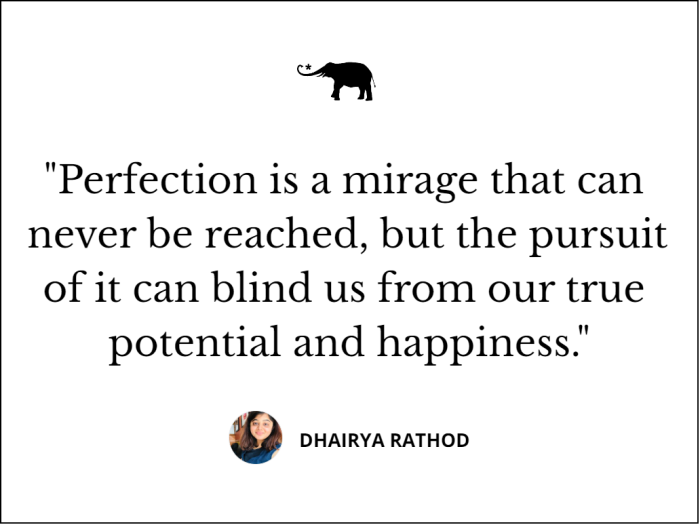Yes, you read it right. If you are running for perfections, please stop there and take a you U-turn. Because there is a dead end. There is no way further.
Because…
Perfection is often considered an illusion because it is a standard that is almost impossible to attain, especially in complex or creative endeavors. In most cases, perfection is subjective and varies from person to person based on their individual preferences, values, and beliefs. What one person considers perfect, another may not.
Moreover, the pursuit of perfection can be limiting and can hinder growth and progress. When individuals focus solely on achieving perfection, they may become overly critical of themselves and others, leading to anxiety, stress, and dissatisfaction. This can prevent them from taking risks, trying new things, and learning from mistakes.
“Perfection is a mirage that can never be reached, but the pursuit of it can blind us from our true potential and happiness.”
In many cases, the pursuit of perfection can also lead to a lack of satisfaction or fulfillment. Individuals may never feel like they have achieved their desired level of perfection, leading to a perpetual sense of dissatisfaction and frustration.
Therefore, while striving for excellence and setting high standards for oneself can be positive and motivating, it is essential to recognize that perfection is an ideal that is difficult to attain and may not be the most fulfilling or healthy approach to life.
Based on the general principles of well-being and personal growth, imperfections can be beneficial for people to embrace imperfection.
Embracing imperfection means accepting oneself, flaws and all, and recognizing that making mistakes and experiencing failures is a natural part of the learning and growth process. When people embrace imperfection, they can let go of unrealistic expectations and judgments, reducing stress and anxiety and promoting a sense of well-being.
Embracing imperfection also allows people to be more flexible and adaptable in their thinking, behaviors, and attitudes. They can be open to learning from their experiences, being creative in finding solutions, and being less critical of themselves and others.
Furthermore, embracing imperfection can promote a growth mindset, which is the belief that abilities and skills can be developed through hard work, dedication, and persistence. People with a growth mindset are more likely to take risks, learn from their mistakes, and see challenges as opportunities for growth and improvement.
Overall, embracing imperfection can be a positive and healthy approach to life, promoting well-being, personal growth, and adaptability.
Accepting and respecting one’s imperfections can lead to increased self-acceptance and happiness. Although nobody is flawless and we all have shortcomings, it’s vital to acknowledge and value the distinctive attributes that make each of us who we are. By embracing imperfection, we can release the pressure to be flawless and instead focus on our talents and what actually makes us happy. This can lead to increased self-esteem and a more optimistic attitude on life.
“Perfection is an illusion that blinds us from seeing the beauty in our imperfections.”


 Share on bsky
Share on bsky





Read 0 comments and reply